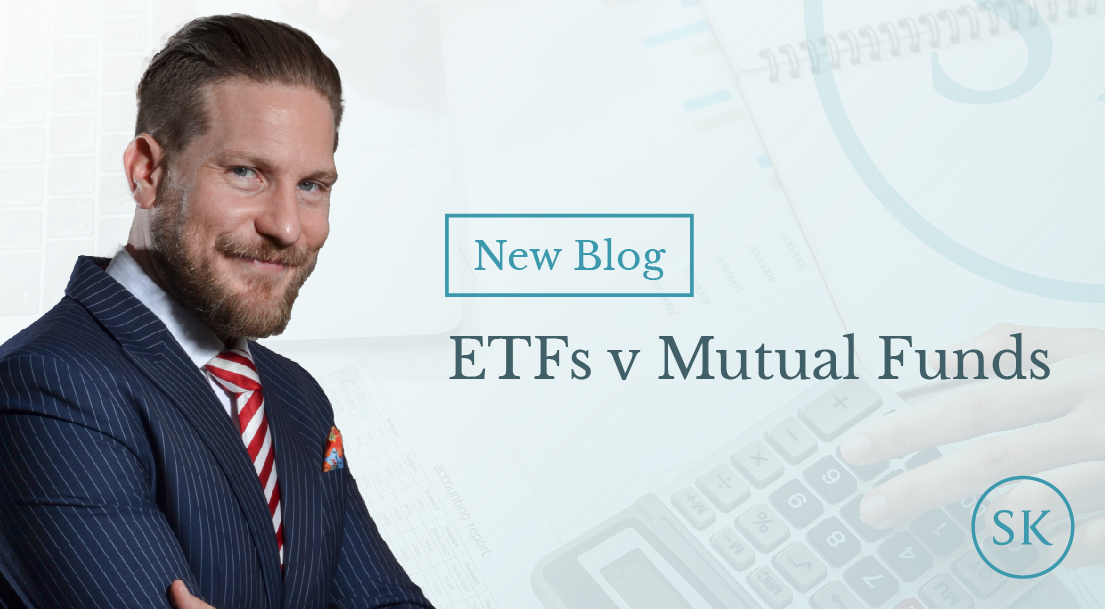ETFs v Mutual Funds

The financial sector is constantly moving and evolving at a lightning-fast pace. In recent years we have seen significant changes and developments, such as the introduction of Exchange Traded Funds (ETFs). Due to often similar investment goals, many people are now questioning the value of mutual funds against ETFs. There are various issues to consider, and each investment vehicle has several pros and cons.
What is an ETF?
As the name suggests, an ETF is a fund tradable on stock markets similar to company shares. While you buy units in a mutual fund, when it comes to an ETF, you are purchasing a share in the company which holds the fund. ETFs have become very popular in recent years, seen by many as a prompt and efficient way to react to changing market trends and investor demands. However, those writing-off mutual funds in favour of ETFs may be a little hasty.
Dealing facilities
When it comes to dealing in ETFs and mutual funds, there is a significant difference. ETFs are bought and sold on the stock market without direct contact with the company. On the other hand, mutual funds are bought and sold directly with the company issuing units (usually the fund manager). In addition, as ETFs are tradable within stock market opening hours, they are relatively liquid with the potential for intraday movement. Consequently, you can deal in ETFs in real time as you would any other share.
The situation with mutual funds is different, with the price set once daily based on the fund's net asset value. As a result, there are no opportunities to trade mutual funds intraday, which is essential for day/short-term traders.
It is also important to look at the situation regarding commission and dealing charges. While these may vary across the board, the upfront charge for mutual funds can be less than ETFs. However, introducing brokers can receive a commission from the fund manager and perhaps a degree of trailing income. When looking at both ETFs and Mutual Funds, it is important you understand how they are charged as it is not always black and white.
When exploring fees and charges, it is also worth noting that cheaper is not necessarily better, but we must consider the value of the cost. You may pay more for a Mutual Fund, but if it delivers enhanced performance, then it is worth it.
ETF: Real-time trade prices during stock market opening hours and upfront dealing charges
Mutual Fund: Price set once a day by fund manager, with minimal upfront dealing charges but possible commission paid to introducing agent
Pricing
In theory, the price of ETFs and mutual funds is based on the underlying net asset value of the fund. However, even though the majority of ETFs are extremely liquid, there may be some that struggle with relatively low liquidity. In this situation, it may be possible to buy shares in an ETF at a discount to the net asset value. On the flip side, if there is strong demand for an ETF, this may squeeze the price higher, with investors potentially paying more than the net asset value of the underlying fund.
The situation is straightforward regarding mutual funds; they are priced once a day based on the fund's net asset value.
ETF: Broadly priced on the fund value but also market liquidity and supply/demand
Mutual Fund: Price is based on net asset value
Liquidity
The subject of liquidity is very different for ETFs and mutual funds because of how they are set up. Similar to a listed company, ETFs have a constant number of shares in issue, and they are known as closed-ended funds. On the other hand, a mutual fund can redeem or issue unlimited units depending on capital inflows and outflows, and they are known as open-ended funds.
As ETFs are usually created to track leading benchmarks, they are popular with investors, with many funds valued in the billions of dollars. As a result, trade tends to be relatively active, and liquidity is high. It is the same for mutual funds, which invest in liquid assets. As trades are executed directly with the fund manager, they can redeem or issue new units dependent upon capital flows.
In extreme market conditions, mutual funds invested in illiquid assets such as real estate may experience short-term liquidity issues. However, most funds will have liquid assets on hand to cover traditional short-term capital flows.
ETF: Closed-ended funds where liquidity tends to be very high
Mutual Fund: Open-ended funds where liquidity is not usually an issue
Portfolio performance
While traders will look at the methods of dealing in ETFs and mutual funds, long-term investors may be more interested in portfolio performance. Overall, ETFs focus on specific indices, with the underlying fund replicating the benchmark spread of investments. While there are mutual funds which are designed and structured to follow specific indices, others are less restricted.
When it comes to ETFs, there are no real investment decisions to make; follow the makeup of the benchmark, adjusting as and when changes are announced. Those mutual funds not benchmarked to a particular index have the potential to outperform markets, although they can also underperform. While both investment vehicles are exposed to market volatility, known as systemic risk, those mutual funds which are not benchmarked are also exposed to unsystematic risk, which is investment specific.
ETF: Benchmarked ETFs are exposed to systemic risk (also known as market risk)
Mutual Fund: Mutual funds can be exposed to systemic and unsystematic risk
Management charges
Overall, management fees associated with ETFs tend to be lower than mutual funds, but this can vary. Mutual funds which track a particular benchmark are likely to have significantly reduced expenses compared to their actively managed counterparts. All investment vehicles, whether ETFs or mutual funds, are legally obliged to publish management charges and other fees associated with their operation.
While management fees are a consideration for investors, comparing and contrasting fund performance is also essential.
ETF: Charges are typically lower than mutual funds
Mutual Fund: Charges tend to be higher than ETFs
Niche markets
ETFs were introduced as a tradable means of focusing on specific markets/indices instead of individual shares. Some ETFs are worth literally hundreds of billions of dollars, while others, focused on niche markets, will be valued at a fraction. It is possible to gain access to niche markets via ETF instruments, as demonstrated by the growing number of crypto asset ETFs. However, this assumes the creation of the appropriate index/benchmark.
In theory, mutual funds can track any index/benchmark or take a more management-led approach towards individual assets. Over the years, we have seen commodity funds, metal funds, stock index funds, and more. Due to the nature of mutual funds, there is potential to introduce niche elements that depend more on individual fund manager successes than simply following the weightings of a benchmark.
ETF: Tend to follow indices/benchmarks
Mutual Fund: More potential for a niche approach focused on investment management decisions
Mutual funds are still very relevant
At face value, many people automatically assume that ETFs are taking over the mutual fund world and that mutual funds will eventually need to convert to ETFs or close. There are numerous pros and cons when looking at ETFs and mutual funds, which means they can operate side-by-side. Mutual funds may be more appropriate for those with a long-term outlook than those looking to trade in the short term.
Summary
After looking at the various pros and cons, it is essential to put everything into perspective. While crypto asset ETFs, as one example, has received much applause for their prompt reaction to growing investor demand, there are also mutual funds offering exposure to crypto assets. While ETF supporters will suggest they are more flexible than mutual funds, many would question that broad claim. Mutual funds have been popular for many years, based on a relatively rigid structure, and it would be foolish to suggest they are going anywhere in the foreseeable future.
